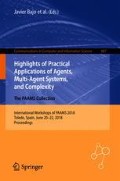Abstract
The integration of geolocation, big data and cognitive agents has become one of the most boosting business tools of the digital era. By definition, geolocation represents the use of different technologies in a variety of applications to help locate humans and objects. To really achieve smart services, companies also require accessing huge volumes of related information to draw meaningful conclusions. With big data, it is possible to establish connections between a wide range of associated information, and use it to improve available services or create new ones. Today, the influence of geolocation, cloud data science and involved cognitive agents impacts many application fields, which include: safety and security, marketing, beacon technology, geofencing, location-sensitive services, transportation and logistics, healthcare, urban governance, intelligent buildings and smart cities, intelligent transport systems, advanced driver assistance systems, and autonomous and semi-autonomous vehicles. To address these challenges, this paper presents a general associative-cognitive architecture framework to develop goal-oriented hybrid human-machine situation-awareness systems focused on the perception and comprehension of the elements of an environment and the estimation of their future state for decision-making activities. The architecture framework presented emphasizes the role of the associated reality as a novel cognitive agent and the involved semantic structures, to improve the capabilities of the corresponding system, processes and services. As a proof of concept, a particular situation awareness agent for geolocation of vehicles in tunnels is shown, that uses cloud data association, vision-based detection of traffic signs and landmarks, and semantic roadmaps.
Access this chapter
Tax calculation will be finalised at checkout
Purchases are for personal use only
References
Endsley, M.R.: Towards a theory of situation awareness in dynamic systems. Hum. Factors 37(1), 32–64 (1995)
Endsley, M.R., Jones, D.G.: Designing for Situation Awareness: An Approach to Human-Centred Design. Taylor & Francis, London (2012)
Nowak, C., Lambert, D.: The semantic challenge for situation assessments. In: IEEE 8th International Conference on Information Fusion, July 2005, Los Alamitos (2005)
Baader, F., et al.: A novel architecture for situation awareness systems. In: Giese, M., Waaler, A. (eds.) TABLEAUX 2009. LNCS (LNAI), vol. 5607, pp. 77–92. Springer, Heidelberg (2009). https://doi.org/10.1007/978-3-642-02716-1_7
Kokar, M.M., Matheus, C.J., Baclawski, K.: Ontology-based situation awareness. Inf. Fusion 10(1), 83–98 (2009)
Kokar, M.M., Endsley, M.R.: Situation awareness and cognitive modeling. In: IEEE Intelligent Systems, Cyber-Physical-Social Systems, pp. 2–7, May–June 2012
Ulicny, B., et al.: Augmenting the analyst via situation-dependent reasoning with trust-annotated facts. In: Proceedings of the 2011 IEEE International Multi-Disciplinary Conference Cognitive Methods in Situation Awareness and Decision Support, pp. 17–24. IEEE (2011)
Laing, C., Vickers, P.: Context informed intelligent information infrastructures for better situational awareness. In: International Conference on Cyber Situational Awareness, Data Analytics and Assessment (CyberSA), 8–9 June 2015
Steinberg, A.N., et al.: Revisions to the JDL data fusion model. In: Proceedings of the SPIE Sensor Fusion: Architectures, Algorithms and Applications, pp. 430–441 (1999)
Lundquist, C.: Automotive sensor fusion for situation awareness. Ph.D. thesis, Department of Electrical Engineering, Linköping University, Sweden (2009)
Golestan, K., Soua, R., Karray, F., Kamel, M.S.: Situation awareness within the context of connected cars. Inf. Fusion 29, 68–83 (2016)
Aghdam, H.H., Heravi, E.J.: Guide to Convolutional Neural Networks. A Practical Application to Traffic-Sign Detection and Classification. Springer, Heidelberg (2017). https://doi.org/10.1007/978-3-319-57550-6
Houben, S., Stallkamp, J., Salmen, J., Schlipsing, M., Igel, C.: Detection of traffic signs in real-world images: the German Traffic Sign Detection Benchmark (GTSDB). In: Proceedings International Joint Conference on Neural Networks (2013)
Mathias, M., Timofte, R., Benenson, R., Van Gool, L.: Traffic sign recognition - how far are we from the solution? In: Proceedings of the International Joint Conference on Neural Networks (2013)
Sun, Z.L., Wang, H., Lau, W.S., Seet, G., Wang, D.: Application of BW-ELM model on traffic sign recognition. Neurocomputing 128, 153–159 (2014)
Zeng, Y., Xu, X., Fang, Y., Zhao, K.: Traffic sign recognition using deep convolutional networks and extreme learning machine. In: He, X., Gao, X., Zhang, Y., Zhou, Z.-H., Liu, Z.-Y., Fu, B., Hu, F., Zhang, Z. (eds.) IScIDE 2015. LNCS, vol. 9242, pp. 272–280. Springer, Cham (2015). https://doi.org/10.1007/978-3-319-23989-7_28
TensorFlow Models Repository. https://github.com/tensorflow/models. Accessed 04 Feb 2018
Szegedy, C., et al.: Going deeper with convolutions. In: Proceedings of the 2015 IEEE Conference on Computer Vision and Pattern Recognition (2015)
Acknowledgements
This work has been supported by the Spanish Ministry of Economy y Competitiveness under project number TIN2014-57458-R.
Author information
Authors and Affiliations
Corresponding author
Editor information
Editors and Affiliations
Rights and permissions
Copyright information
© 2018 Springer International Publishing AG, part of Springer Nature
About this paper
Cite this paper
Fernández, F., Sánchez, Á., Suárez, A., Vélez, J.F. (2018). Situation Awareness Cognitive Agent for Vehicle Geolocation in Tunnels. In: Bajo, J., et al. Highlights of Practical Applications of Agents, Multi-Agent Systems, and Complexity: The PAAMS Collection. PAAMS 2018. Communications in Computer and Information Science, vol 887. Springer, Cham. https://doi.org/10.1007/978-3-319-94779-2_35
Download citation
DOI: https://doi.org/10.1007/978-3-319-94779-2_35
Published:
Publisher Name: Springer, Cham
Print ISBN: 978-3-319-94778-5
Online ISBN: 978-3-319-94779-2
eBook Packages: Computer ScienceComputer Science (R0)

